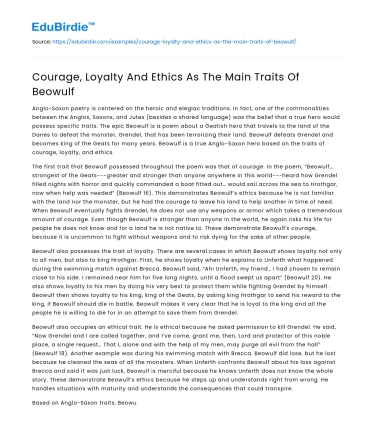Anglo-Saxon poetry is centered on the heroic and elegiac traditions. In fact, one of the commonalities between the Anglos, Saxons, and Jutes (besides a shared language) was the belief that a true hero would possess specific traits. The epic Beowulf is a poem about a Geatish hero that travels to the land of the Danes to defeat the monster, Grendel, that has been terrorizing their land. Beowulf defeats Grendel and becomes king of the Geats for many years. Beowulf is a true Anglo-Saxon hero based on the traits of courage, loyalty, and ethics.
The first trait that Beowulf possessed throughout the poem was that of courage. In the poem, “Beowulf… strongest of the Geats---greater and stronger than anyone anywhere in this world---heard how Grendel filled nights with horror and quickly commanded a boat fitted out… would sail across the sea to Hrothgar, now when help was needed” (Beowulf 16). This demonstrates Beowulf’s ethics because he is not familiar with the land nor the monster, but he had the courage to leave his land to help another in time of need. When Beowulf eventually fights Grendel, he does not use any weapons or armor which takes a tremendous amount of courage. Even though Beowulf is stronger than anyone in the world, he again risks his life for people he does not know and for a land he is not native to. These demonstrate Beowulf's courage, because it is uncommon to fight without weapons and to risk dying for the sake of other people.
Save your time!
We can take care of your essay
- Proper editing and formatting
- Free revision, title page, and bibliography
- Flexible prices and money-back guarantee
Beowulf also possesses the trait of loyalty. There are several cases in which Beowulf shows loyalty not only to all men, but also to king Hrothgar. First, he shows loyalty when he explains to Unferth what happened during the swimming match against Brecca. Beowulf said, “Ah! Unferth, my friend… I had chosen to remain close to his side. I remained near him for five long nights, until a flood swept us apart” (Beowulf 20). He also shows loyalty to his men by doing his very best to protect them while fighting Grendel by himself. Beowulf then shows loyalty to his king, king of the Geats, by asking king Hrothgar to send his reward to the king, if Beowulf should die in battle. Beowulf makes it very clear that he is loyal to the king and all the people he is willing to die for in an attempt to save them from Grendel.
Beowulf also occupies an ethical trait. He is ethical because he asked permission to kill Grendel. He said, “Now Grendel and I are called together, and I’ve come, grant me, then, Lord and protector of this noble place, a single request… That I, alone and with the help of my men, may purge all evil from the hall” (Beowulf 18). Another example was during his swimming match with Brecca. Beowulf did lose, but he lost because he cleaned the seas of all the monsters. When Unferth confronts Beowulf about his loss against Brecca and said it was just luck, Beowulf is merciful because he knows Unferth does not know the whole story. These demonstrate Beowulf’s ethics because he steps up and understands right from wrong. He handles situations with maturity and understands the consequences that could transpire.
Based on Anglo-Saxon traits, Beowulf is a hero due to his courage, loyalty, and his ethics.






 Stuck on your essay?
Stuck on your essay?

